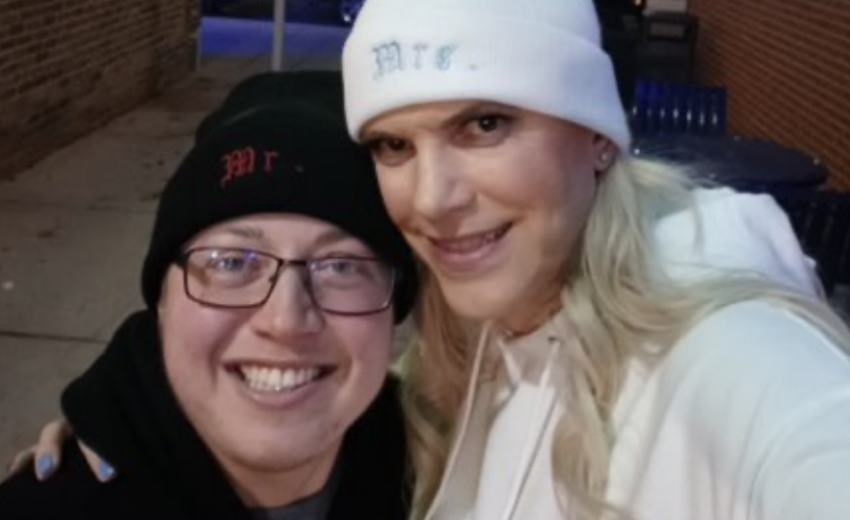
This article was originally published in the Spring 2023 Humanistic Judaism Magazine. It was written by Max Lark and Stacy Wolf-Lark. Max (he/they) is a lifelong Humanistic Jew. He loves traveling and drinking tea. He holds a Master’s degree in Public Administration which specializes in LGBTQ studies and care for older Americans. Stacy (she/her) has served in the U.S. Army for over four years including a tour in Iraq. She has a Master’s degree in English, is a Christian, and a serious dog-lover.
I remember where I was when my therapist told me “Transitioning should be joyous.” I was taking this telehealth appointment outside, watching the sun sink below the trees and feeling the grass between my toes. It was 2021, the second summer of the pandemic. Shortly afterward, my therapist recommended I get involved with other queer groups. From there I tried Affirmations in Ferndale, Michigan, which is 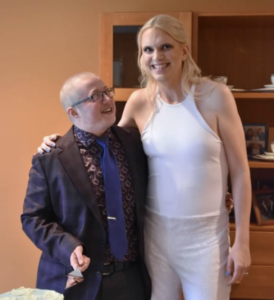 where I met the woman who would one day become my wife, Stacy.
where I met the woman who would one day become my wife, Stacy.
Identity is a multifaceted issue. I am a student, a gardener, a painter, a much-beloved grandchild, and a transgender man. My wife is similarly complex. She is a government worker, veteran, seamstress, and a Star Trek enthusiast. She is also a transgender woman. During our wedding, we were surrounded by family and friends, many of whom are also transgender and non-binary, not to mention various sexual orientations. We are living in a time of great exploration of the self.
I am thankful for the visibility transgender people and other members of the LGBTQ+ communities are experiencing. I regret that this comes at the cost of increased pushback. There has been an increase in hateful laws that aim to drive queer people out of society. Every single one of my queer friends has faced discrimination on both micro and macro levels. We exist as political figures, constantly being asked to justify our own validity.
The questioning of our sexual and gender identity is similar to the questioning I encounter as a Humanistic Jew. While Humanistic Jews may not experience the levels of hatred and discrimination faced by LGBTQ+ people in US society, we often are pushed to the outskirts of Jewish circles due to our lack of theism. Many times, I have had people incredulously ask, “How can you be Jewish without god?” I view this question in the same vein as “Why are you transgender?” Even people who ask out of concern or desire to understand “how long have you felt this way” are missing the point. I do not “feel” transgender any more than I “feel Jewish,” I simply am.
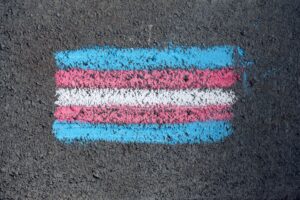 Humanistic Judaism encourages a strong sense of self. It is difficult to assert an identity that challenges the existing worldview on gender’s immutableness. One needs to possess inner strength, and it is much easier to do with understanding and supportive loved ones. I am grateful for my upbringing in the Congregation for Humanistic Judaism of Metro-Detroit. The support I am privileged to experience has allowed me to live as my most authentic self, in defiance against claustrophobic social norms and detrimental institutions.
Humanistic Judaism encourages a strong sense of self. It is difficult to assert an identity that challenges the existing worldview on gender’s immutableness. One needs to possess inner strength, and it is much easier to do with understanding and supportive loved ones. I am grateful for my upbringing in the Congregation for Humanistic Judaism of Metro-Detroit. The support I am privileged to experience has allowed me to live as my most authentic self, in defiance against claustrophobic social norms and detrimental institutions.
Although institutions can seem abstract, the threat these institutions pose to myself and others like me is very real. When your identity has been twisted so that society views you as a threat you become incredibly cautious about your own behavior. Laws that proclaim to “protect children” by banning drag performances can actually be used to persecute gender nonconforming and genderqueer people. Since there is no visible distinction between drag and being a transgender woman, these laws have made it illegal for my wife to go out in public. Stacy and I also avoid interacting with children because we are worried that someone will accuse us of behaving inappropriately simply by being near children. There are places in my home state where it is not safe to show affection to my wife for fear of violent discrimination. The areas where we can exist without fear of persecution grow smaller every day.
As humanists, one of our core beliefs is the pursuit of social justice. Queer people need legal protections, an end to discriminatory practices, and an end to medical gatekeeping. We need to end book bans regarding LGBTQ themes. We demand to be visible, and you can help. Some things you can do include 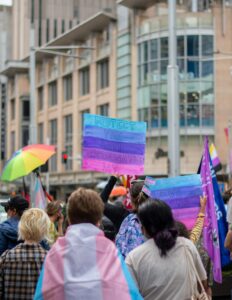 donating to the Trevor Project, a charity that helps LGBT youths. Or you can pressure your representatives to pass more inclusive laws.
donating to the Trevor Project, a charity that helps LGBT youths. Or you can pressure your representatives to pass more inclusive laws.
Stacy and I face many challenges ahead. Despite those challenges, I and many others choose to seek joy, to carve out a life of our own in a world that insists we should not exist. I am so thankful to my friends and community that have shown me overwhelming amounts of support. And I am thankful to my wife, whose kindness and tenacity are the sparks that illuminate my future, whatever that may be, and whomever we may be when we arrive at it.
I of course cannot fully encapsulate the experience of what it is to be transgendered, especially what it is like being a trans woman, so I have asked my wife to tell her story…
Coming out as a transgender woman was one of the craziest experiences of my life. My gender identity was something that I had struggled with for as long as I could remember. I had not been raised in a home that would have supported a transition of any kind, but to be clear, back then I didn’t know what “transgender” was or that transition was even a thing that people could do. I just thought that I was weird to be interested in so many stereotypically feminine things. It wasn’t until my early 30s that I put all the pieces together and realized that there was a label to describe who I was and that there were a lot of other people like me.
The act of coming out was exhilarating. I could feel a flood of emotions overwhelm me and a burdensome weight lift off my shoulders. I was so excited to explore who I was and have my outward appearance match who I knew I was inside.
The act of coming out was exhilarating. I could feel a flood of emotions overwhelm me and a burdensome weight lift off my shoulders. I was so excited to explore who I was and have my outward appearance match who I knew I was inside. Unfortunately, the rest of society was not as excited about me as I was. I had been living my life as a cisgender, heterosexual white man in the United States, which meant that I was about as privileged as a person could be without wealth. Life as a transgender woman would be much different.
Shortly after coming out, same-sex marriage was legalized in the United States. With this issue decided, Republicans needed someone else to get their base foaming at the mouth over, so they chose us. As the “bathroom bills” began rolling out, I could feel the looks from people around me becoming more hostile. What were once double-takes of curiosity turned into glares of mistrust and hatred. I was a predator pretending to be a woman to gain access to women’s bathrooms and to take showers with children. After the bathroom bills came the military ban. Despite being an Iraq War veteran, I was told that I and others like me were unworthy of military service, this coming from a president who had more bone spurs than brain cells. Then came the sports debate. Imagine being both unfit for military service and a threat to dominate the Olympics. Now some states are making it illegal for teachers to mention the existence of transgender people and are trying to establish a database of people who identify as transgender.
On top of what was happening in my country, I was having trouble at home. My family, whom I had tried to keep in the dark about my identity as much as possible, finally learned who I was and no longer wanted me around.
With this going on, I was motivated to change the community around me. I was a short drive away from a small town that was known for its acceptance of queer identities, so I started there. It wasn’t long before this town was like every other town: it was made more for cisgender, heterosexual people. The difference was that they hung up pride flags and employed a few queer people to put in the back of restaurants to make food for cis-het customers. People like me were welcomed as far as I was great for the town’s aesthetics. I was there to be watched by people-watchers. I simply would not accept this. I started by petitioning the local government and businesses to promote trans visibility. I wanted to see trans people being accepted, not just being told that I’m being accepted in a caption of a picture of a cisgender couple with a blurry pride flag in the background. I was polite in my suggestions. At first. Some businesses and organizations were slow to embrace what I was selling; some never did.
I made a lot of people unhappy by rocking the boat, but I also found a community of other transgender people. One of them was Max, who was my polar opposite. We would walk around town together, Max pointing out the beauty of the community and me being hyper-aware of the prejudice we were facing with every step. Somehow these differences only made us draw closer to each other. I started to see things the way Max did, and Max started to understand and see what I was saying about the need to change our community.
In December of 2022, Max and I were married. We still struggle with a world that is determined to debate our humanity. We still check the news every day, wondering what the next crazy attempt to eliminate us from public will come next. The difference is that now we’re looking together. Between Max, myself, and our growing community of transgender people (and supporters), I believe we’re going to win in the end.
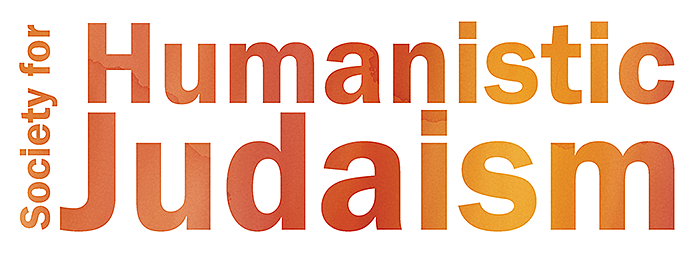
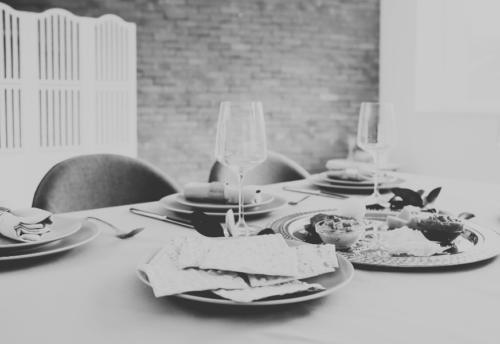
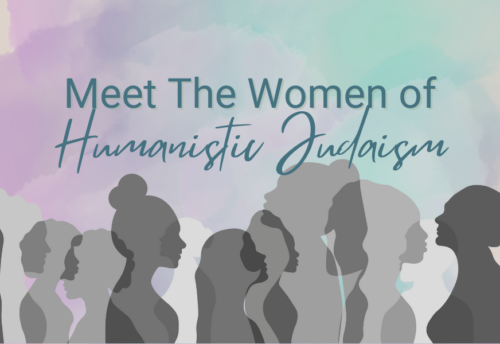
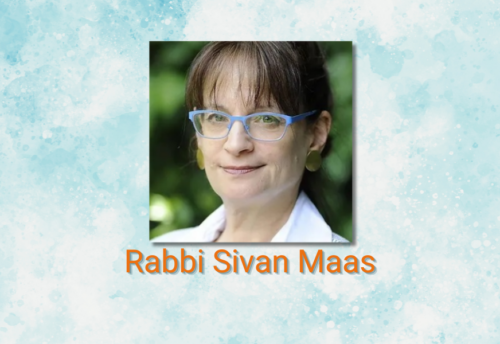
Thank you, Max and Stacy, for sharing your challenging and empowering journeys, and teaching us through your perceptions. All the best to you both!